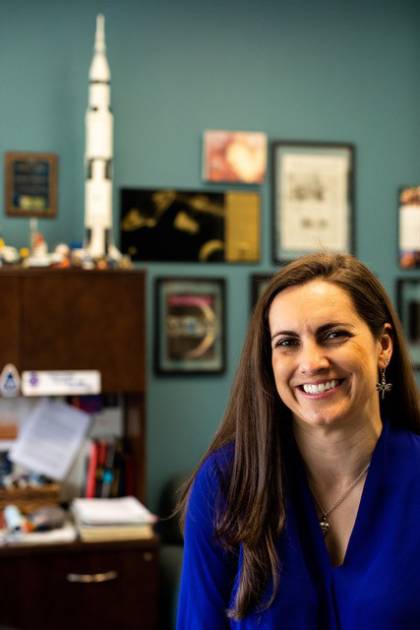Feb 10, 2022 | No Comments | By Michelle Pagano
In a surprise virtual presentation, JHU President Ron Daniels presented the award to Alexis Battle, an associate professor in the Department of Biomedical Engineering, and Sarah Hörst, HEMI Fellow and an associate professor in the Department of Earth and Planetary Sciences. Both researchers will receive $250,000 to pursue new lines of research, expand their laboratories, or support their lab members.
“Let me take this moment to say how dazzled we were, Alexis and Sarah, by the ambitions and scope of your research and how highly your colleagues, mentors, and students regard each of you,” said Daniels in the virtual presentation. “Having a way to honor those qualities in our faculty was a reason why we created this amazing award eight years ago. … You both join a cadre of truly remarkable people from across all our divisions whose work truly stands apart.”
The President’s Frontier Award was originally launched with a commitment of $2.5 million from trustee Louis J. Forster, A&S ’82, SAIS ’83, and is now paired with a $1 million donation from alumnus David Smilow, A&S ’84. Winners have spanned the university’s divisions and included molecular biologist Andrew Holland (2021), mathematician Emily Riehl (2020), astrophysicist Brice Ménard (2019), nephrologist and epidemiologist Deidra Crews (2018), composer Michael Hersch (2017), molecular biologist Scott Bailey (2016), and stem cell research Sharon Gerecht (2015).
The award typically recognizes one winner and one finalist each year, but Battle and Hörst were both selected this year based on the strength of their applications and the demonstrated impact and continued potential of their work.
“The two of you embody in some sense the incredible breadth of research that goes on at JHU,” said Ed Schlesinger, dean of the Whiting School of Engineering. “From the very smallest genetic materials that define what life is all about to the planets, space, the cosmos, and the search for life beyond our own world—there is something particularly poetic about the juxtaposition of both of [your work].”
Hörst, a planetary scientist, studies the composition and characteristics of aerosols in the atmospheres of early Earth and other planets. Using laboratory experiments, modeling, and remote sensing and in situ measurements of atmospheric chemistry, Hörst and her lab work to understand how small molecules transition to become aerosols and the resulting physical and chemical properties of those particles.

Image caption:Sarah Hörst
The work has implications for assessing the habitability of other planets and for the search for life beyond our solar system. Under the right conditions, adding energy to simple mixtures of common gases can produce much more complex molecules like amino acids, which form the building blocks of living organisms.
Essential to her work is her groundbreaking approach to laboratory science. Using a custom-built Planetary Haze Research lab—a one-of-its-kind experimental lab—Hörst and her group simulate the chemical reactions that contribute to the formation of aerosols in planetary atmospheres. With this approach, she can experiment with a vast range of temperatures (90-800 degrees Kelvin, or -297-980 degrees Fahrenheit) and can use different energy sources to initiate chemical reactions across a variety of atmospheric gases and conditions. Her lab is the first in the world to be dedicated to studying photochemical haze production in exoplanet environments, and she has published research on Saturn, Saturn’s moon Titan, and early Earth.
Hörst’s work is directly relevant to important space missions, including two upcoming NASA missions: Dragonfly, which will investigate prebiotic organic chemistry and habitability on Saturn’s largest moon, Titan; and DAVINCI+, which will probe the chemical composition of the atmosphere of Venus.
“Particularly impressive is her ingenuity and creativity in developing and leading a new scientific field essentially from scratch: extrasolar planet atmosphere laboratory studies,” wrote Sabine Stanley, a Bloomberg Distinguished Professor and chair of the Department of Earth and Planetary Sciences, in a letter nominating Hörst for the award. “Her work has already had major impact on the global effort to observe and characterize exoplanet atmospheres.”
She received the 2020 LAD Early Career Award from the American Astronomical Society’s Laboratory Astrophysics Division and the prestigious 2020 James B. Macelwane Medal from the American Geophysical Union, widely considered the highest honor for early career scientists in the field of geological and planetary sciences. She received a Johns Hopkins Catalyst Award in 2017 and was a co-investigator on a Discovery Award led by Maya Gomes in 2020.
Hörst received two bachelor of science degrees—one in planetary science and one in literature—from the California Institute of Technology. She received her PhD in planetary sciences from the University of Arizona, Tucson. She joined Johns Hopkins in 2014 and currently mentors three graduate students, two postdoctoral research fellows, and an associate research scientist.
Chris Celenza, dean of the Krieger School of Arts and Sciences, gave Hörst particular praise for her emphasis on mentorship and collegiality.
“I often think that we are at our best in the arts and sciences when we’re reciprocally reinforcing conversations among faculty, postdocs, graduate students, and undergraduates,” Celenza said during the award presentation. “I know in your lab, you’ve cultivated that very type of engagement, so I want to thank you, deeply, for all you have done for this wonderful Department of Earth and Planetary Sciences and for Johns Hopkins and for the Krieger School.”
Hörst’s dedication to her lab members was evident from the moment they “Zoom bombed” the meeting, joining in on the coordinated surprise. “When I saw the names popping up on the screen, all I could think was how much more great science the people who are already working with me are going to get to do,” Hörst said through tears. “And that means the absolute world to me.”
This article is excerpted from The Hub. The original piece was published on January 26, 2022.



